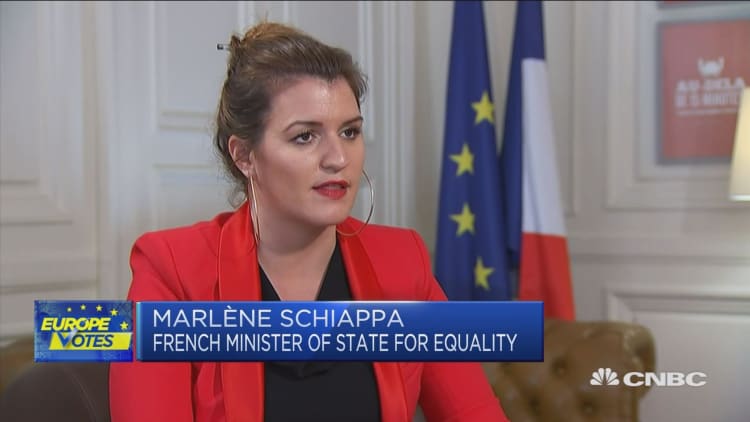Former White House chief strategist Steve Bannon has been accused of interfering in Europe's parliamentary elections taking place this week.
Trump's former advisor is in Paris as Europeans head to the polls. His presence there comes after several years of courting the region's populist, nationalist and far-right politicians in a bid to forge alliances among the EU's euroskeptics.
One of the leaders he has backed is Marine Le Pen, head of France's far-right National Rally party (formerly known as the National Front) that will be going head-to-head with French President Emmanuel Macron's La Republique En Marche party.
Predicting a win for Le Pen and her party, Bannon told Le Parisien newspaper Friday that there would be an "earthquake" on the day of the vote. The newspaper also reported Sunday that its reporter had seen "two executives" of Le Pen's party, that it named, emerge from Bannon's hotel suite in Paris. The executives said Le Pen was not aware of their meeting with Bannon.
But on Monday, Bannon denied he is playing any role in Le Pen's campaign and said he was in France merely "as an observer." Speaking to French broadcasters BFM TV, he insisted "Marine Le Pen does not need my help to win."
Le Pen also denied Bannon had any role in her campaign and said she did not even know he was in Paris for business. "It has nothing to do with the campaign. It is you, the media that are dragging him into the campaign," Le Pen also told FranceInfo on Monday, Reuters reported.
Bannon's presence in Paris has nonetheless caused alarm among Macron's party and the government.
Marlène Schiappa, France's minister of state for gender equality, said that other parties are "not playing fair – when you see that Steve Bannon is in France now helping Marine Le Pen I think it's a huge question and we need to ask about it," she told CNBC's Joumanna Bercetche in Paris.
"I think Steve Bannon is making interference in this election because he's coming in France, in Paris … to do what, we don't know, but Steve Bannon said to the journalist that his goal is to destroy Europe."

Meanwhile, Macron's campaign chief, Stéphane Séjourné, tweeted that Bannon's presence in France "is an attack on the sovereignty of the election" and was a "strategy by nationalists" that made him want to vomit. Separately, Nathalie Loiseau, a candidate in the European election for Macron's En Marche party, is widely reported as saying: "Steve Bannon does not even hide his desire to interfere in our polls."
Persona non grata
Bannon is something of a persona non grata among Europe's liberal establishment as he has tried to foment support for right-wing parties in the region with his Brussels-based organization called The Movement.
Founding the group in 2017, Bannon said he wanted to create a populist right-wing "supergroup" that could win as much as a third of the 751 seats up for grabs in the EU Parliament.
The Movement aimed to unite parties across Europe — ranging from Lega in Italy and Hungary's Fidesz (whose leader, Prime Minister Viktor Orban welcomed Bannon's group) to the Alternative for Germany (AfD) party and Austria's Freedom Party — to contest the European elections.
But the impact of The Movement may have stalled with some European countries operating outright bans (or at least caps) on foreign organizations contributing to political parties It has also been met with mixed signals from some far-right parties too.
Election nerves
The elections (which take place on different days in Europe, starting on May 23) see EU member states elect lawmakers to the European Parliament.
The parliament contains alliances of European parties, the main groups being the European People's Party (EPP) alliance, which groups together conservative and center-right parties, and its rival socialist alliance called the Progressive Alliance of Socialists and Democrats (S&D). There are other alliances too that group together European green parties or liberal centrists.
The vote is being closely watched in France as it's seen as a litmus test of the popularity (or lack thereof) of Macron.
The last presidential election in France in 2017 saw a run-off vote between Macron and Le Pen and although Macron won the vote by a decisive margin, his popularity has waned to a dramatic low since then. His reforms have proved unpopular and have prompted widespread protests in France.
More worryingly for Macron and Europe's liberal establishment, polls suggest Macron and Le Pen are neck-and-neck in an EU election in which populists are expected to perform well throughout Europe.


